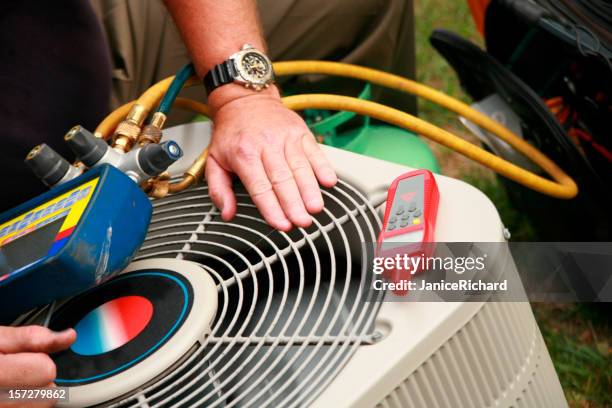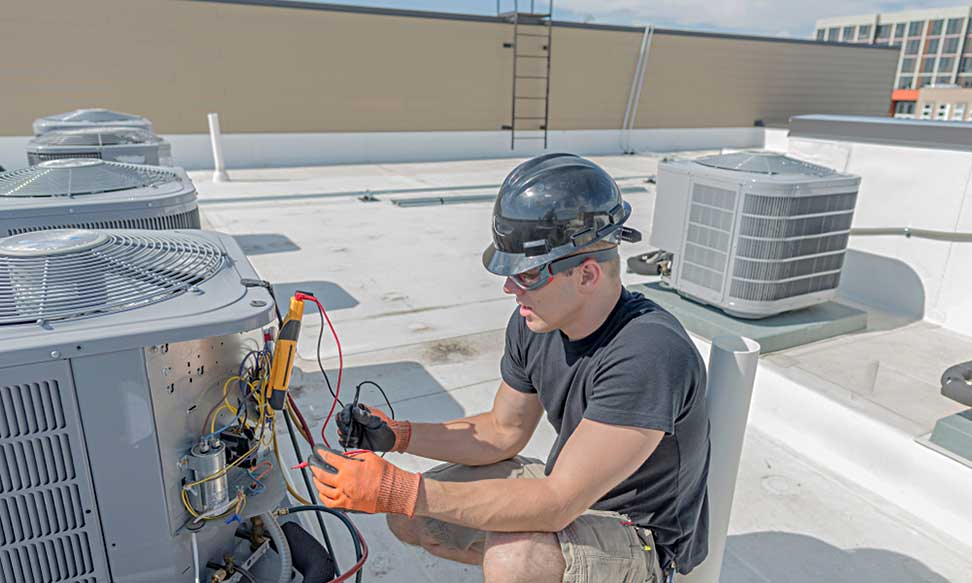Installing ductless mini splits: A Wise Investment for Energy-Efficient Living
Installing ductless mini splits: A Wise Investment for Energy-Efficient Living
Blog Article
Selecting In Between a Heatpump and Furnace: Trick Considerations for Your Heating And Cooling Demands
When assessing home heating options for heating and cooling requires, the decision between a warm pump and a heating system can be complex. Each system supplies distinct benefits customized to certain environments and energy efficiency goals. Understanding these distinctions is crucial for making an informed option. Key variables such as installment costs and environmental influence better complicate the selection procedure. Which option really lines up with one's convenience and sustainability choices? The following sections will certainly discover these considerations carefully.
Comprehending Heat Pumps: Exactly How They Function and Their Benefits
While lots of homeowners consider numerous home heating choices, comprehending just how heatpump feature and their advantages can substantially influence their decision. Heatpump run by transferring heat instead of generating it. In the winter season, they remove warmth from the outside air or ground and move it indoors, while in the summer season, they reverse this procedure, cooling the home by eliminating warmth outside. This dual functionality makes them functional for year-round environment control.One of the main advantages of heatpump is their power performance. They utilize considerably much less electrical power contrasted to typical heating unit, potentially leading to lower energy expenses (heat pump service). Furthermore, heatpump have a smaller carbon footprint, making them an environmentally pleasant option. They additionally need much less upkeep than traditional systems, adding to lasting cost savings. Generally, recognizing the mechanics and advantages of warm pumps can assist homeowners make educated decisions regarding their home heating and cooling demands
Discovering Heaters: Types, Procedure, and Advantages
Heaters come in different types, consisting of gas, electrical, and oil models, each with distinctive functional mechanisms. Comprehending these differences is crucial, as they influence performance and heating performance. Additionally, heating systems offer many advantages, such as consistent warmth result and integrity in chillier environments.
Kinds of Heaters
Furnace can vary substantially in layout and operation, with heating systems being a prominent option among home owners. There are numerous kinds of heaters, each using different fuel resources and innovations. Gas heaters are typical, leveraging gas to generate heat efficiently. Electric heaters, on the other hand, utilize electric resistance to produce warmth, often preferred for their simple installment. Oil heating systems, while much less typical, work in locations with restricted gas accessibility (heat pump replacement ooltewah tn). Furthermore, condensing heating systems make best use of power effectiveness by catching and recycling exhaust gases. Each kind runs via a system of warm exchangers and ductwork to distribute cozy air throughout a home. Understanding the differences in between these furnace kinds is important for educated HVAC decisions
Benefits of Furnaces
For property owners seeking reliable heat during chilly months, the advantages of furnaces are considerable. Heaters provide consistent home heating, guaranteeing even temperature levels throughout the home. They are particularly efficient in extreme cold, often surpassing heatpump in freezing conditions. Different kinds, consisting of gas, electrical, and oil heating systems, provide versatility to fulfill varied requirements and preferences.Furnaces additionally often tend to have reduced initial installation expenses contrasted to heatpump, making them a much more easily accessible choice for many. Their durable design contributes to a longer life expectancy, with numerous units lasting over 15 years with proper upkeep. In addition, contemporary heaters are often furnished with sophisticated modern technology for enhanced effectiveness, which can cause minimized energy bills. On the whole, furnaces continue to be a trustworthy option for reliable home heating.

Power Effectiveness: Contrasting Warmth Pumps and Furnaces
When comparing power efficiency between heat pumps and furnaces, the Seasonal Power Effectiveness Ratio (SEER) plays an essential function in identifying efficiency. Furthermore, a functional price evaluation discloses the lasting economic ramifications of each system. Understanding these aspects can assist property owners in making notified decisions concerning their home heating services.
Seasonal Power Performance Proportion
Power efficiency plays a crucial role in the decision-making process in between heatpump and heaters, specifically when thinking about the Seasonal Energy Efficiency Ratio (SEER) This statistics steps the cooling efficiency of warm pumps over a whole cooling season, providing a standardized method to evaluate performance. Greater SEER ratings indicate better power efficiency, equating to reduced energy intake and reduced utility bills. In comparison, heaters are commonly assessed utilizing the Yearly Gas Use Efficiency (AFUE) ranking, which mirrors home heating performance. When comparing these 2 systems, home owners need to prioritize SEER ratings for warmth pumps, as they directly influence total power savings and environmental sustainability. A thorough understanding of SEER can significantly influence the long-lasting satisfaction and cost-effectiveness of the selected HVAC option.
Operational Expense Evaluation
Comprehending the operational expenses related to warmth pumps and heaters is vital for homeowners assessing their choices. Heatpump normally offer greater energy effectiveness, transforming electrical energy into warmth with very little waste. This causes lower regular monthly energy bills, specifically in modest climates. Alternatively, standard heaters, specifically gas designs, may have lower upfront prices but can sustain higher operational expenditures with time due to sustain rates and efficiency ratings.Moreover, heat pumps can work as both home heating and cooling down systems, possibly reducing the demand for different cooling and heating devices. While initial investments for heatpump may be greater, their long-term savings in energy effectiveness can make them a much more affordable option for many houses. Careful analysis of local power prices is vital to figure out the very best alternative.
Setup Costs: What to Expect for Each Heating System
Installment expenses for furnace can differ significantly between heat pumps and heaters, influencing property owners' decisions. Heat pumps generally have higher ahead of time setup expenses, typically varying from $3,500 to $8,000, depending upon the device dimension and complexity of installation. This includes the exterior system, indoor handling system, and required ductwork modifications. Conversely, furnaces tend to have reduced preliminary expenses, averaging in between $2,500 and $6,000, which can be appealing for budget-conscious homeowners. However, installation expenditures can increase if extensive ductwork is required.Moreover, the choice of gas kind for weblink heaters-- all-natural gas, propane, or electrical-- can additionally influence setup costs. While heatpump use power effectiveness, their first financial investment may hinder some customers. Eventually, reviewing setup expenses along with long-term savings and performance will certainly help house owners in making notified choices concerning their heater.
Climate Considerations: Which System Carries Out Much Better in Your Area
Exactly how do climate conditions affect the effectiveness of heating unit? The performance of heatpump and heaters can vary substantially depending upon the local environment. In modest environments, heatpump succeed by effectively transferring warmth from the outside air, making them an energy-saving choice. However, their effectiveness diminishes in incredibly cool temperatures, where they might battle to draw out enough warmth. On the other hand, heating systems, especially gas versions, offer trusted and consistent warmth regardless of exterior problems, making them better in cooler regions.In locations that experience milder winter seasons, heatpump can operate properly year-round, providing both cooling and heating. In comparison, regions with severe winters often profit from the toughness of heaters. Inevitably, understanding the neighborhood climate is vital when making a decision in between a heatpump and a heating system, as it directly influences their operational effectiveness and total performance.
Maintenance Demands: Long-Term Take Care Of Warmth Pumps vs. Furnaces
While both warmth pumps and furnaces call for routine maintenance to assure peak efficiency, their specific needs and treatment routines vary considerably. Furnaces typically require much less constant attention, with yearly examinations being sufficient to look for gas leaks, clean filters, and examine overall capability. Their simpler design typically enables straightforward repairs.In comparison, heatpump demand biannual upkeep due to their twin role in cooling and heating. This includes cleansing coils, inspecting cooling agent degrees, and ensuring that both the exterior and indoor devices operate at their ideal. Additionally, heatpump upkeep typically entails even more complex elements, making expert maintenance essential.Neglecting maintenance can cause lessened performance and raised power expenses for both systems. Ultimately, property owners must take into consideration these long-term care needs when picking in between a heatpump and a furnace, as aggressive maintenance can extend the life expectancy and efficiency of either system substantially.
Ecological Effect: Choosing a Sustainable Heating Option
The environmental effect of heater is a critical analysis for house owners looking for sustainable options. Heatpump are normally a lot more energy-efficient than traditional furnaces, as they move warmth instead than produce it, significantly minimizing carbon exhausts. By using sustainable energy sources, such as air-source or geothermal heatpump, property owners can additionally minimize their eco-friendly footprint.On the other hand, gas furnaces give off greenhouse gases and add to air pollution, though they often provide greater heat outcome. Nevertheless, developments in modern technology have actually brought about the advancement of high-efficiency furnaces that minimize emissions.Ultimately, picking a heater involves weighing efficiency versus environmental impact. Home owners are urged to review regional power resources and rewards for eco-friendly systems, making certain a selection that lines up with both individual comfort and environmental obligation. The decision impacts not only prompt convenience yet also long-term sustainability and environmental health.
Regularly Asked Inquiries
How Much Time Do Heat Pumps and Furnaces Commonly Last?
The life-span of warmth pumps typically ranges from 15 to 20 years, while heaters can last in between 15 to three decades. Routine maintenance considerably influences their durability and efficiency in providing home heating options.
Can I Make Use Of a Heatpump in Very Cold Climates?
Warmth pumps can operate in incredibly chilly environments, yet their efficiency lessens as temperatures decline. In such problems, supplementary home heating sources might be essential to keep comfy interior temperature levels and ensure peak performance.

What Is the Sound Degree of Heat Pumps Versus Furnaces?
The noise degrees of warmth pumps and heating systems go differ substantially. Generally, heat pumps run even more quietly than typical furnaces, making them more suitable for those sensitive to sound, while furnaces may create louder functional sounds during heating cycles.
Are Warmth Pumps Suitable for Both Heating & Cooling?
Heatpump are undoubtedly suitable for both cooling and heating (furnace replacement). They function by transferring heat, giving efficient temperature control year-round, making them a functional choice for house owners looking for an all-in-one a/c service
What Size Heater Do I Required for My Home?
Determining the proper dimension furnace for a home calls for reviewing factors such as square video, insulation high quality, local environment, and the home's design. Consulting an expert can assure an exact assessment and excellent comfort. Heat pumps usually offer greater power effectiveness, converting electric energy right into warm with very little waste. In moderate climates, warmth pumps succeed by effectively moving warmth from the outside air, making them an energy-saving alternative. On the other hand, heating systems, especially gas designs, offer consistent and trustworthy warm no matter of exterior conditions, making them better in chillier regions.In areas that experience milder winter seasons, warmth pumps can operate effectively year-round, providing both heating and air conditioning. Warmth pumps are usually a lot more energy-efficient read more than standard heaters, as they move warmth instead than create it, significantly lowering carbon exhausts. By making use of renewable power sources, such as geothermal or air-source warm pumps, house owners can even more lessen their environmental footprint.On the various other hand, all-natural gas heaters give off greenhouse gases and add to air pollution, though they often provide higher warmth output.
Report this page